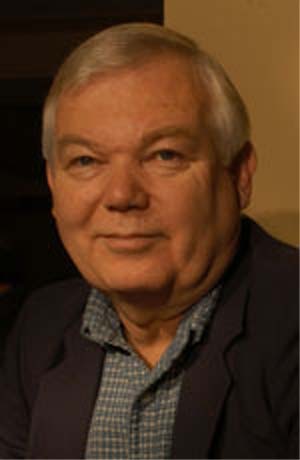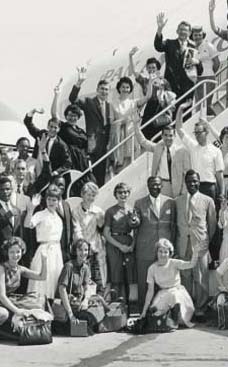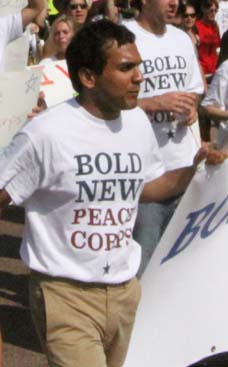
In his study, Michalak examined 23 major films about Arabs and Muslims between the years 1999 and 2010 - categorizing them as positive, negative, and neutral films - to understand how the image of Arabs and Muslims in American cinema evolved in the recent past. Despite challenges in properly fitting each of these films into precise categories, Michalak rated 11 of them positive, six neutral, and four negative. He created an alternative category for two films, which were about the 9/11 terrorist attacks, which needed separate discussion and classification. "There has never been a positive [main stream] movie with a main character who was an Arab or a Muslim before 1999," Michalak explained to SUSRIS. Two 1999 releases –The Thirteenth Warrior and Three Kings – portrayed Arabs in a realistic, non-negative light. This seemed to be the start of a new era of more conscientious and well-informed filmmaking, but when the 9/11 terrorist attacks occurred in 2001, Michalak feared the prevalence of negative portrayals would return. However, he found this not to be the case. In the following years other movies with Arab or Muslim characters appeared on the scene, including Kingdom of Heaven in 2005. This film portrayed Muslims as the "good guys" and the crusaders as the "bad guys". In his conversation with SUSRIS, Michalak cited several other films since 9/11, including Syriana and The Kite Runner, which portrayed diverse Middle Eastern characters. In the case of the movie The Kite Runner, Afghans and Muslims are represented based on characters in the book, which was written by an Afghani. Michalak's assessment noted the positive depiction of Islam.
Tunisia RPCV Dr. Larry Michalak, PhD, a cultural anthropologist and Middle East specialist from the University of California, Berkeley, recently talked with SUSRIS about the "Improvement in Images of Arabs and Muslims in Recent American Cinema"
Images of Arabs and Muslims in American Cinema
December 11, 2010
Elizabeth R. Pfiester | SUSRIS
Dr. Michalak
Dr. Larry Michalak, PhD, a cultural anthropologist and Middle East specialist from the University of California, Berkeley, recently talked with SUSRIS about the "Improvement in Images of Arabs and Muslims in Recent American Cinema." Dr. Michalak's research about the film portrayals was the subject of a paper he presented last month at the Middle East Studies Association annual conference in San Diego. [Interview on SUSRIStube.com]
In his study, Michalak examined 23 major films about Arabs and Muslims between the years 1999 and 2010 - categorizing them as positive, negative, and neutral films - to understand how the image of Arabs and Muslims in American cinema evolved in the recent past. Despite challenges in properly fitting each of these films into precise categories, Michalak rated 11 of them positive, six neutral, and four negative. He created an alternative category for two films, which were about the 9/11 terrorist attacks, which needed separate discussion and classification.
"There has never been a positive [main stream] movie with a main character who was an Arab or a Muslim before 1999," Michalak explained to SUSRIS. Two 1999 releases –The Thirteenth Warrior and Three Kings – portrayed Arabs in a realistic, non-negative light. This seemed to be the start of a new era of more conscientious and well-informed filmmaking, but when the 9/11 terrorist attacks occurred in 2001, Michalak feared the prevalence of negative portrayals would return. However, he found this not to be the case. In the following years other movies with Arab or Muslim characters appeared on the scene, including Kingdom of Heaven in 2005. This film portrayed Muslims as the "good guys" and the crusaders as the "bad guys". In his conversation with SUSRIS, Michalak cited several other films since 9/11, including Syriana and The Kite Runner, which portrayed diverse Middle Eastern characters. In the case of the movie The Kite Runner, Afghans and Muslims are represented based on characters in the book, which was written by an Afghani. Michalak's assessment noted the positive depiction of Islam.
The Kingdom, which focuses on Saudi Arabia specifically, represents Saudi Arabians positively. It was a story of an investigation by American agents into a terrorist attack against an American residential compound in the Kingdom. Michalak explained that the leading Saudi Arabian character, a senior police officer, was one of the heroes of the movie. He added that the Royal Family was positively depicted, especially as contrasted with an American diplomat who sought to quash the FBI investigation. Even the terrorists are humanized and seen as complex people in this film, according to Michalak.
In September of 2007, SUSRIS examined The Kingdom giving readers an inside look at the production notes. The Kingdom's Director, Peter Berg commented on the movie, "After 9/11, there was so much anti-Saudi sentiment in the States, because so many of the hijackers were from Saudi Arabia .. but, it wasn't reflected in my relationships with Saudis I knew." Berg believed that there was no better time to make a film that "looks at the joint Arab and American fight against violent extremism." He noted, "The movie is about Americans and Arabs working together in a very decent and human way."
In his paper on Arabs and Muslims in cinema, Dr. Michalak explored reasons why negative stereotyping may not have increased after 9/11.
The silver lining to the black cloud of 9/11 is that it has led to an increased interest in Islam and an upsurge in the numbers of people studying Arabic. More young Americans are studying abroad in countries such as Morocco, Tunisia, Egypt, Jordan and Oman. The result is a steady increase in American sophistication about the Middle East and the Muslim world, which is all to the good.
Michalak was asked by SUSRIS how his analysis of these films speaks to the image of Arabs in American society as a whole.
Until recently there's been a great deal of ignorance about the Middle East and about Islam, and especially since 9/11 there has been great attention to Middle Easterners, Middle East politics, and Islam. What has developed is there is a big debate that is going on. On the one hand you have the people who present Islam as a negative religion .. But at the same time there is at least an equal number – probably even more – scholars of Islam who present Islam as a positive religion, who present Islam as a religion which is basically very, very similar to Judaism and Christianity .. they tend to be very polarized. They either have a very positive view of Islam or a very negative view but there is a struggle going on.
However, people are learning more about Islam and about the Middle East and I think that the more people study Islam and the Middle East the more they are, shall we say, alleviated of their negative stereotypes, and they achieve a much more nuanced and generally positive picture of people who live in the Middle East. In other words, Arabs, Muslims, they're not the most wonderful people in the world and they are not the most terrible people in the world. They are fundamentally just like us, and their religion is very, very similar to Judaism and Christianity.
Dr. Michalak noted his research is not comprehensive, but the broad scope of films selected and explored demonstrate that Arabs and Muslims have gone from being generally vilified in cinema to being humanized and respected. "The substantial number of films with positive Arab and Muslim characters is a sign that things are changing. Presumably, we can all agree that negative stereotyping is harmful and that Americans should strive for critical thinking, understanding, tolerance and multi-culturalism."
Dr. Laurence Michalak received his BA from Stanford with honors (1964) and served in the Peace Corps in Tunisia for two years as a Volunteer (1964-66) and two years as Associate Director (1967-69). He completed his PhD in Cultural Anthropology at Berkeley in 1983. For 23 years he was Vice Chair of the Center for Middle Eastern Studies at UC/Berkeley, retiring in 2002. Since retiring he has done postdoctoral research in alcohol studies, gone around the world as a visiting professor on the Semester at Sea program, and directed an American overseas research center in Tunis. He has spent over ten years in the Arab World, mostly in Tunisia, and has published two edited books (on social legislation in the Middle East) and on the effects of labor migration on North Africa), plus numerous articles and reviews. He is currently working part-time at UC/Berkeley as the Faculty Advisor for the undergraduate major in Middle Eastern Studies.















